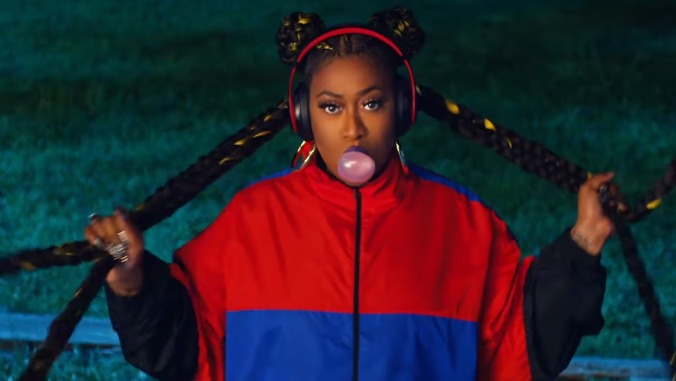Missy Elliott, Iconology, and the impact of belated praise

There was a dramatic energy shift that took place just over seven minutes into the 2015 Super Bowl Halftime show. The aerial shot of Katy Perry’s candy-coated, beachy set for “California Girls” quickly cut to a dark, smoky silhouette. Missy Elliott’s profile was as distinctive as the first six notes of her 2001 hit “Get Ur Freak On,” which rang throughout the stadium just before the stage exploded into a collection of dancers and pyrotechnics. Elliott quickly took command of one of the biggest venues in the world, a feat that only time-tested performers can manage. It wasn’t exactly a homecoming—after all, she did briefly take the stage with Pharrell during the 2014 BET Awards—but it felt like a triumphant return to a space befitting her legacy. It would become the most-watched halftime show in history.
And yet, there’s still a dichotomy between the enormity of her moment and the reality of the overall show: Despite an overwhelming catalog of music and a deep bench of former collaborators, Elliott was not the headliner that night. Perry isn’t to blame for that any more than those who have won Video Music Awards over Elliott prior to “Work It” are at fault for her many snubs. Despite her history of hits, five Grammy wins, and the winding roster of Grammy-winning artists she has written and produced for—Janet Jackson, Ariana Grande, Beyoncé, and Whitney Houston, to name a few—she has never performed on the Grammy stage.
But it appears that the industry is beginning to catch up by atoning for some of its more glaring oversights throughout the years. In January, the Songwriters Hall Of Fame inducted Elliott, making her the first female hip-hop artist to receive the honor. Last night, MTV finally recognized her with the Video Vanguard Award, a moment that Justin Timberlake and Ciara rightfully dubbed “overdue” and that her fans have spent years heavily campaigning for, including last year’s honoree Jennifer Lopez. The long wait is indicative of an industry that has voiced respect for the legend, but been very slow to fully celebrate her contribution to the music landscape over the past two decades.
Though the feeling of accolades owed may still linger, her greatest reward is likely her immovable cultural presence, despite not having released an album since 2005’s The Cookbook. Her style predates some of the most widely cited innovators in pop music today: N.E.R.D., Lady Gaga, Janelle Monáe, Rihanna, Lizzo, Tierra Whack, Nicki Minaj, Cardi B.—all of whom have named Elliott as one of their biggest inspirations. Elements of their playful, sometimes futuristic work can be traced back to Elliott, whose vision was eras ahead from the moment she first peered daringly into a fish-eyed lens in 1997’s “The Rain (Supa Dupa Fly).” And yet, Elliott still feels obligated to reclaim her influence in music as a woman who has been largely overlooked.
Fast forward to August 23 when Elliott, to everyone’s surprise, dropped Iconology, a five-song EP that stands as a woefully brief, but solid provocation of her place in music history. “Throw It Back,” the collection’s centerpiece, comes equipped with an unrelenting bass line, an amelodic hook, and verses set to remind us just how long she’s been embedded in the fabric of hip-hop and pop. Quippy nudges like “What you doin’ now / I’ve done for a while” and “I did records for Tweet / Before y’all could even tweet” (likely a kind, but knowing nod to the younger crowd who still may question who she is) might be easy for some to write off as the braggadocio typical of hip-hop. In reality, they serve as further reassertion of her lasting impact on the industry as a whole, setting the bar for how artists approach sound and visual presentation.
The rest of Iconology works to further cement her indelible imprint on popular entertainment. “Dripdemeanor,” the tantalizing, slow-tempo groove is her latest entry in a catalog of sex-positive calls to action. The high-octane, ironically named “Cool Off” goes hard with a quick pace that hearkens to a sound popularized in the late ’80s and ’90s, when dance was the only objective. And just in case anyone managed to forget that she was also a vocalist, Elliott provides both instrumental and a capella versions of “Why I Still Love You,” a bluesy doo-wop tune about the most frustrating brand of love. While it would have been ideal to have just a few more tracks to cling to after going 14 years without an album, Iconology is a collection that is so unmistakably Missy Elliott, a luminary who doesn’t show signs of stopping anytime soon.